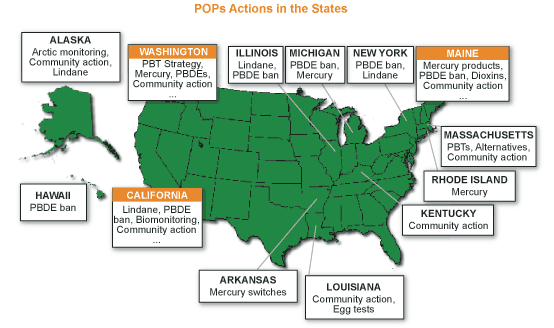States and the Stockholm Convention
 New
Report on the State and the Stockholm POPs treaty
New
Report on the State and the Stockholm POPs treaty
A new CIEL Report recognizes that U.S. political leadership in tackling the challenge of persistent bioaccumulative toxics is among several states and local initiatives. U.S. States and the Global POPs Treaty: Parallel Progress in the Fight Against Toxic Pollution helps put this domestic progress into a larger international context.
The report, authored by environmental health expert Karen Perry Stillerman, provides an overview of the Stockholm Convention on POPs and details the respective roles of the Congress and the President to pass implementing legislation and to ratify the treaty.

It also features a detailed look at several promising approaches to POPs reduction already underway in Maine, California, and Washington State. These efforts are not restricted to these three states, as suggested by the map.
These actions include bans and restrictions on specific chemicals and groups of chemicals such as brominated flame retardants, pesticides, and mercury. Having made major strides in reducing important point sources of toxic contamination in sectors, the emphasis in many states is towards products free of PBTs. Procurement policies provide a positive reinforcement to companies that respond to these market signals.
The Report concludes that:
- U.S. states are at the vanguard of tackling POPs.
- State progress parallels the global POPs movement.
- State actions to reduce chemical threats must be respected.
- U.S. political will is needed for global POPs success.
- People and communities across the country must be heard.
http://www.uspopswatch.org/ratification/pops-and-states.htm